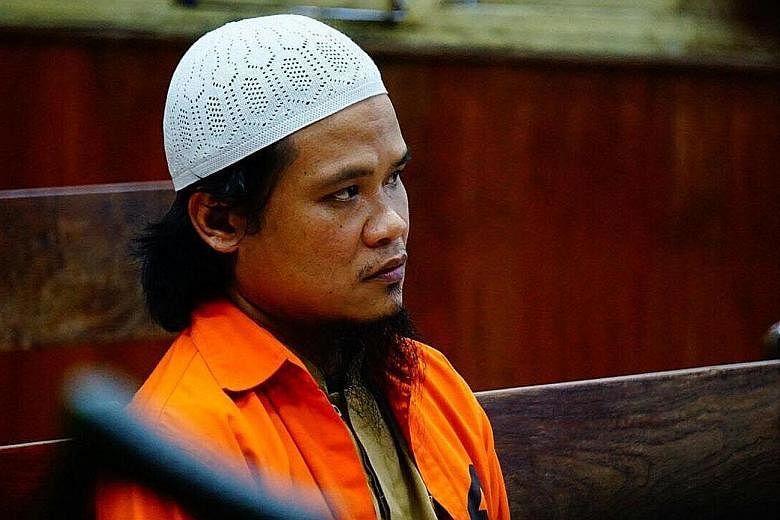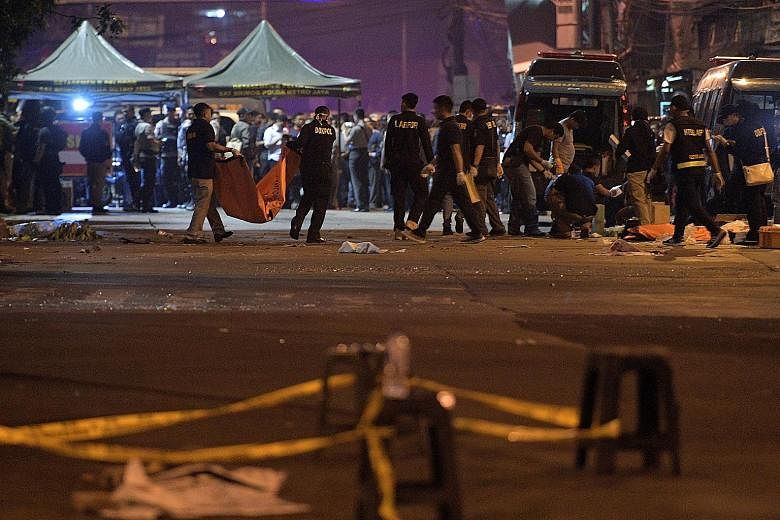A former terrorist bomb-maker turned Islamic preacher has been charged in court with inciting the suicide bombing in East Jakarta which killed three policemen in May.
Kiki Muhammad Iqbal, 38, is accused of delivering a sermon at the Assunah Mosque in Bandung, West Java, on May 19, which centred on how "mati syahid" - or "die as a martyr" - is the ultimate goal of every good Muslim.
The message from Kiki was allegedly directed at Ahmad Sukri and Ikhwan Nur Salam - the duo who died while mounting the suicide attack on May 24, according to court documents read by The Straits Times yesterday.
It is a crime in Indonesia to incite others to commit an act of terrorism. A person could be sentenced to death or life imprisonment if convicted under Clause 14 of the Anti-Terrorism Act.
Kiki, in court on Monday, pleaded not guilty, and claimed he had no knowledge that Sukri and Ikhwan had made bombs and carried out the attack. "I'm shocked to hear my name being mentioned and linked to the Kampung Melayu bombings," he told the North Jakarta District Court on Monday.
Besides killing three policemen, the attack by the two men at a bus terminal in Kampung Melayu also injured 11 others, including a 17-year-old driver and 19-year-old student.
According to eyewitnesses in the densely populated neighbourhood, two loud explosions were heard at about 9pm.
Photos and videos from the scene that circulated shortly after the blasts showed pieces of bloodied human flesh and dismembered body parts, including a limb and what appeared to be a severed head inside the Transjakarta bus shelter.
Kiki was arrested on June 5 in Sumedang, a regency located about two hours from Bandung by car, after police established a link between him and the two attackers.
He was a student of radical cleric Aman Abdurrahman, the leader of the Jemaah Ansharut Daulah, an alliance of Indonesian militants who have pledged their allegiance to the Islamic State in Iraq and Syria (ISIS) terrorist group.
Aman is said to have ordered the suicide attack in Jakarta in January last year, which left four bystanders dead, in what was the first incident claimed by ISIS in South-east Asia.
In 2010, Kiki was arrested as part of a terrorist cell in West Java known as "the Cibiru bomb group" and sentenced to six years in jail for terrorism-related offences a year later. When he was released recently, Kiki refused to undergo a deradicalisation programme conducted by the National Counter-terrorism Agency.
The case against him will head to trial on Dec 20, when prosecutors will have to produce evidence to show how his teachings had directly led to the suicide attack in Kampung Melayu.
Jakarta-based radicalism expert Adhe Bhakti told The Straits Times that proving a case under Clause 14 is always a tall order because prosecutors need to show exactly how the attackers were motivated into action.


